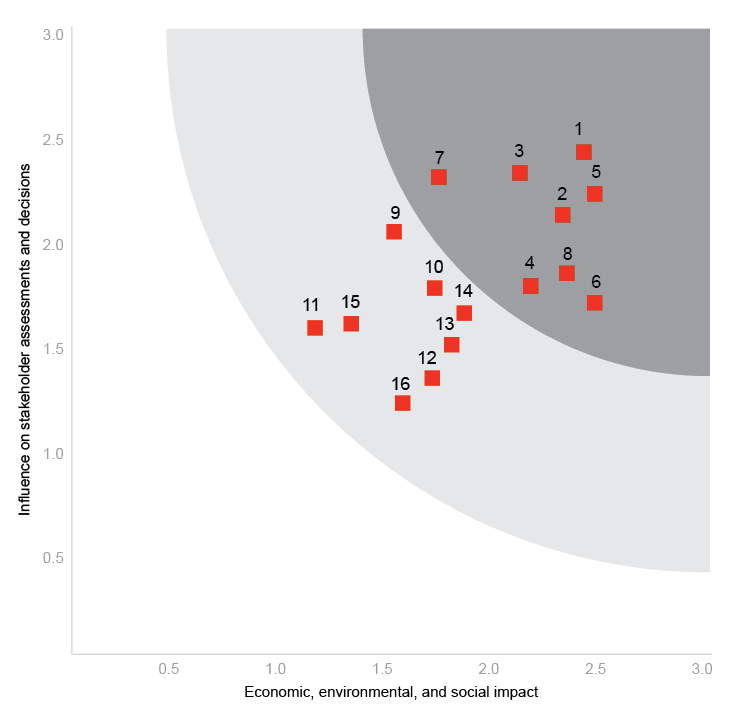MOEX GROUP’S APPROACH TO MATERIALITY
102-49
Determining material topics for the Report is an essential part of preparing non-financial statements as per the GRI Standards. The purpose of this procedure is to study and identify the economic, environmental, and social issues that are most impacted by Moscow Exchange’s activities and are most important to stakeholders.
According to established practice, material topics are analyzed annually, and stakeholders are surveyed once every two years. The material topics identified through the stakeholder survey carried out by Moscow Exchange in 2020 apply to this Report as well.
102-46 102-47 102-43
In 2020, Moscow Exchange made a comprehensive assessment of material topics, taking into consideration the opinions of key stakeholders. As a result of this assessment, 16 topics were identified; their significance was then evaluated according to the following criteria:
- the significance of Moscow Exchange’s impact on economic, environmental and social aspects of the topic in question (the X axis of the matrix of material topics);
- the significance of the topic for stakeholders, based on an evaluation of Moscow Exchange’s impact on stakeholders’ activities (the Y axis of the matrix of material topics);
- the availability of recommendations on disclosing such topics from leading associations, such as the World Federation of Exchanges (WFE) and the Sustainable Stock Exchanges (SSE) Initiative, which represent the interests of the professional community of stock exchanges.
Based on this analysis, the Group prepared a list of eight topics that it deemed material and mandatory for disclosure. Information on other topics has also been disclosed selectively.
Matrix of material topics in 2021

GRI | SASB | |
|---|---|---|
| GRI 103: Management Approach (2016) | FN-EX-410a.3 FN-EX-410a.4 |
| GRI 103: Management Approach (2016) GRI 206: Anti-competitive Behavior (2016) | FN-EX-410a.3 FN-EX-410a.4 FN-EX-510a.1 |
| GRI 103: Management Approach (2016) | – |
| GRI 103: Management Approach (2016) | FN-EX-410a.4 |
| GRI 103: Management Approach (2016) | FN-EX-000.A FN-EX-000.B FN-EX-410a.2 |
| GRI 102: General Disclosures (2016) GRI 103: Management Approach (2016) GRI 415: Public Policy (2016) | – |
| GRI 103: Management Approach (2016) GRI 202: Market Presence (2016) GRI 401: Employment (2016) GRI 402: Labor/Management Relations (2016) GRI 403: Occupational Health and Safety (2018) GRI 404: Training and Education (2016) GRI 405: Diversity and Equal Opportunity (2016) GRI 406: Non-discrimination (2016) | – |
| GRI 102: General Disclosures (2016) GRI 103: Management Approach (2016) GRI 418: Customer Privacy (2016) | FN-EX-410a.1 FN-EX-550a.1 FN-EX-550a.2 FN-EX-410a.2 FN-EX-550a.3 |
Other non-material topics that can be disclosed selectively | ||
| GRI 102: General Disclosures (2016) GRI 419: Socioeconomic Compliance (2016) | – |
| GRI 205: Anti-corruption (2016) GRI 415: Public Policy (2016) | FN-EX-510a.1 FN-EX-510a.2 |
| GRI 102: General Disclosures (2016) GRI 401: Employment (2016) GRI 405: Diversity and Equal Opportunity (2016) GRI 406: Non-discrimination (2016) GRI 408: Child Labor (2016) GRI 409: Forced or Compulsory Labor (2016) GRI 412: Human Rights Assessment (2016) | – |
| – | – |
| – | – |
| GRI 204: Procurement Practices (2016) GRI 408: Child Labor (2016) GRI 409: Forced or Compulsory Labor (2016) | – |
| GRI 302: Energy (2016) GRI 303: Water and Effluents (2018) GRI 305: Emissions (2016) GRI 306: Waste (2020) GRI 307: Environmental Compliance (2016) | – |
| GRI 201: Economic Performance (2016) GRI 203: Indirect Economic Impacts (2016) GRI 413: Local Communities (2016) | – |
